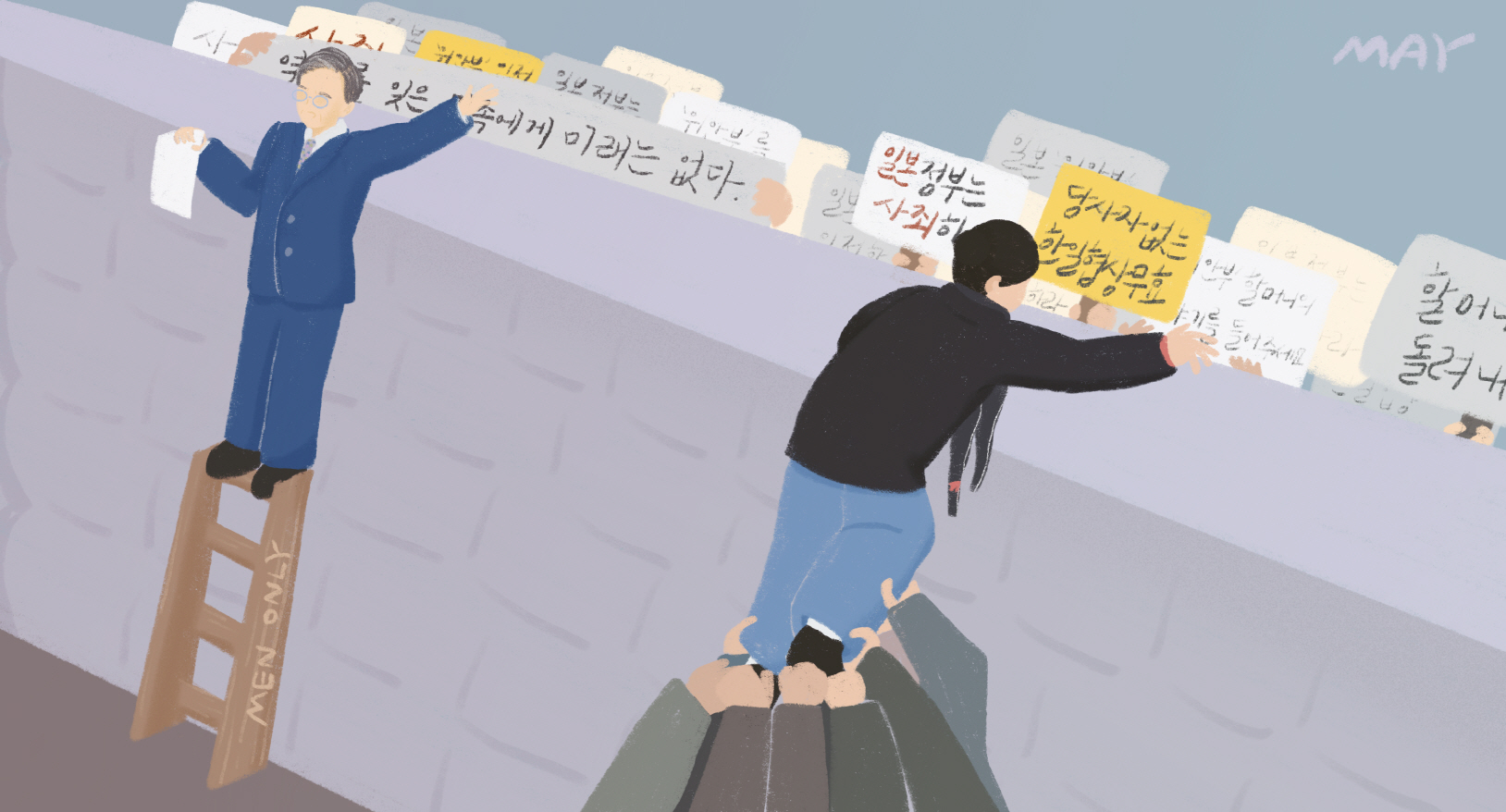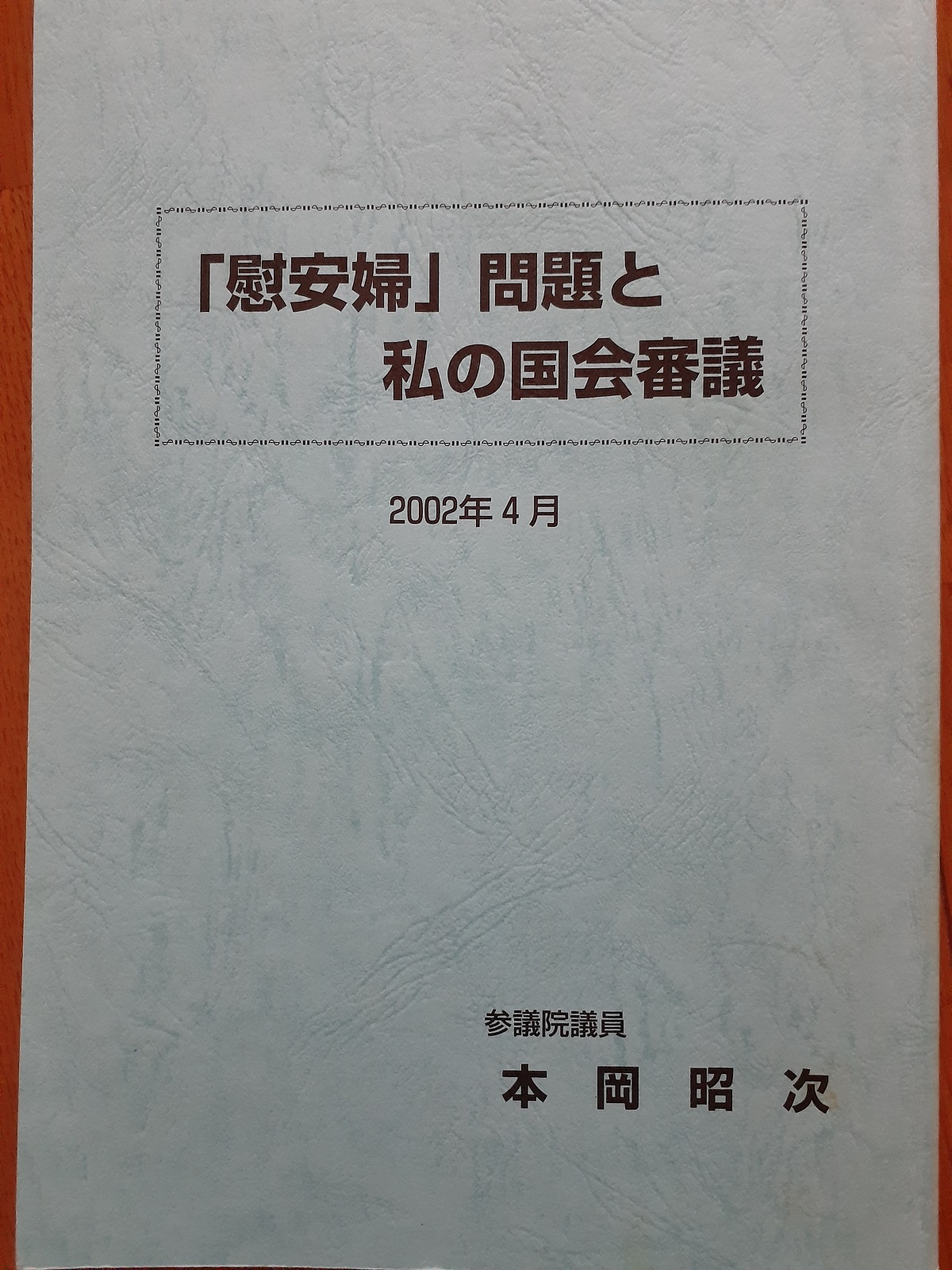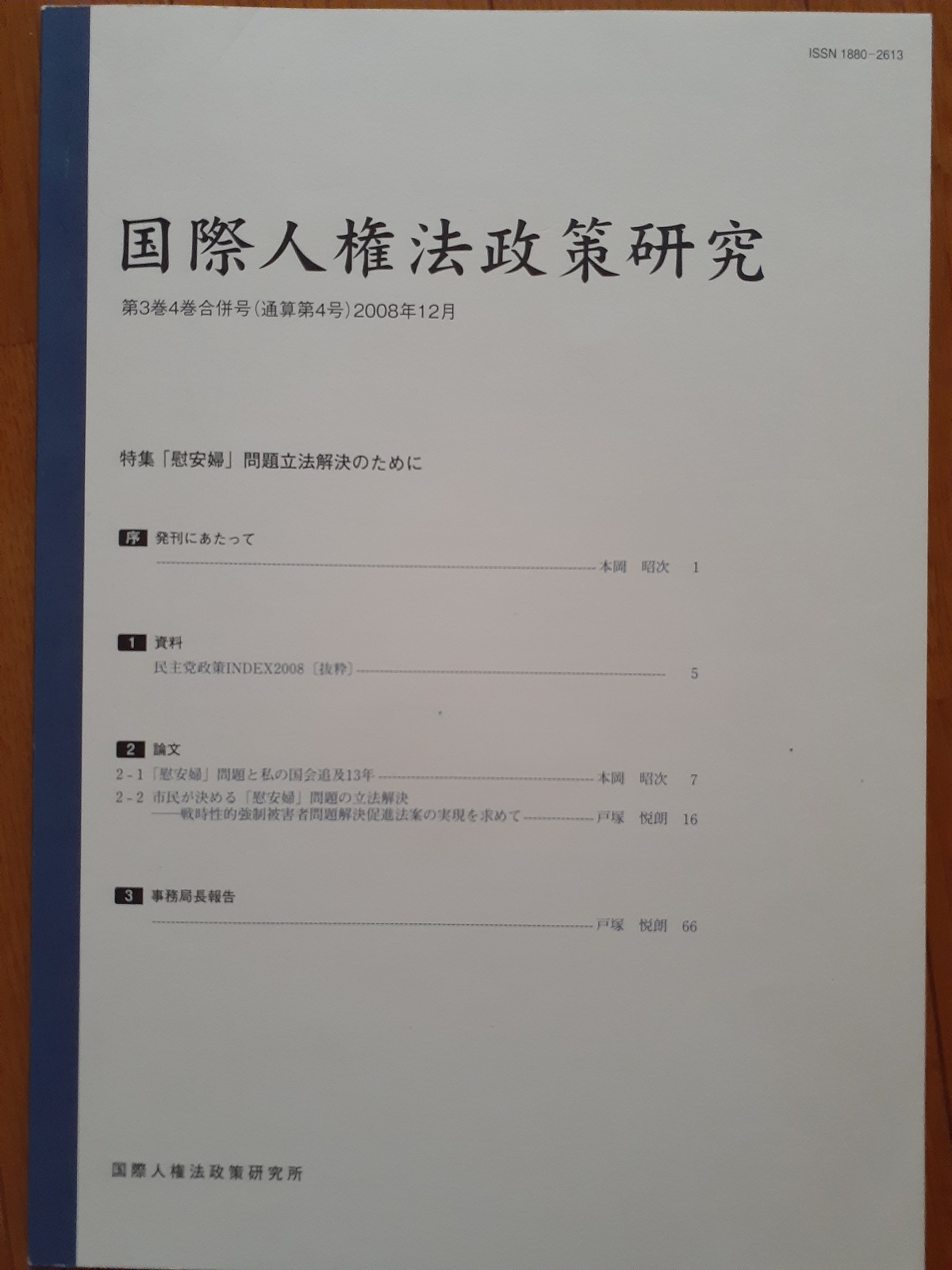4. Challenges Faced by the Legislative Resolution Movement: Two Realistic Obstacles
There were two major difficulties in achieving its realization. First, it was believed that no viable solution could be reached without enacting legislation that would receive support from the victims, such as the Korean Council for the Women Drafted for military Sexual Slavery by Japan (referred to as “Korean Council”). However, the path ahead proved to be even more arduous than anticipated. During my tenure as a visiting researcher at the Law Research Institute of Seoul National University from 1995 to 1998, I developed a personal concept for a legislative solution1 and endeavored to present it. Despite numerous meetings, the legislative proposals I put forth did not elicit a favorable decision.
Second, there were challenges within the National Diet as well. It was necessary to overcome the obstacle known as the “defenses based on treaties.” Government officials and National Diet members (conservatives) claimed that achieving a legislative resolution was impossible due to the “defenses based on treaties” and that enacting legislation for state compensation would violate the 1965 Korea-Japan Claims Settlement Agreement. They sought to block the legislative efforts by asserting that such legislative action contradicted the constitutional obligation of National Diet members, who are public officials, to abide by the treaty. This line of reasoning aimed to obstruct the legislative efforts by deeming the proposed legislation unconstitutional. If we couldn’t overcome this reasoning and gain cooperation from the House of Councilors Legislation Bureau, even if lawmakers submitted a bill, it would not be printed.
To tackle these two daunting challenges, I and other citizens involved in the legislative movement dedicated five years of relentless effort under the leadership of Councilor Motooka and other members of National Diet
Upon recognizing that my proposal was not well-received by Korean victims, I gave up on further persuasion and instead pursued studies at the University of Washington in Seattle, USA, in February 1998. Just before my departure, I sought assistance from Attorney Park Won-soon, who was advising the Korean Council at the time. I asked him to outline the reasons why my proposal was not embraced and then delivered the opinion letter to Councilor Motooka and the responsible individual at the House of Councilors Legal Affairs Bureau. The staff at the House of Councilors Legal Affairs Bureau carefully read and studied the Korean Council’s opinion letter, conducting thorough research to determine what type of legislation would be welcomed by the victims. This comprehensive effort led to the development of the Motooka Bill, which aimed to provide an official “apology.”
On September 8, 1999, during a parliamentary questioning, Councilor Shoji Motooka managed to elicit from Chief Cabinet Secretary Nonaka Hiromu that a compensation bill proposed through parliamentary legislation would not violate any treaties or the constitution.2 This confirmation paved the way for official collaboration from the House of Councilors Legal Affairs Bureau, leading to the introduction of a “Bill on the Establishment of Investigative Council on the Issue of Wartime Sexual Coercion,” commonly referred to as the “Motooka Bill.” This legislation incorporated the term “apology,” which was not originally included in the proposal. During his visit to Korea with the finalized bill, Councilor Motooka personally met with the head of the Korean Council, provided a comprehensive explanation of the bill, and received words of welcome and support.
In this manner, Councilor Shoji Motooka managed to overcome two formidable obstacles, demonstrating the feasibility of legislative resolution. During the 147th regular session of the National Diet on April 10, 2000, Councilor Motooka and others presented a bill to the House of Councilors as a Democratic Party proposal. Subsequently, on October 30, 2000, during the 150th provisional session of the National Diet, the Democratic Party, Communist Party, and Social Democratic Party concurrently introduced similar bills, prompting consultations among the three parties to consolidate the legislation. On March 21, 2001, a joint bill proposed by the three parties was submitted to the 151st National Diet. Following that, opposition parties submitted additional collaborative bills to the House of Councilors a total of ten times, spanning until the 169th regular National Diet in 2008.3 Regrettably, the ruling Liberal Democratic Party and the Komeito Party did not lend their support to the legislation, resulting in its failure to pass.
5. Reflection: Why did the legislation fail to materialize?
In September 2009, the long-awaited government transition occurred, leading to the establishment of Prime Minister Hatoyama Yukio’s administration, with the Democratic Party at its core. The challenge at that time was finding someone who could persuade Prime Minister Hatoyama to support the legislation. However, there is something that continues to perplex me. Prime Minister Hatoyama placed great importance on the Korea-Japan relationship to the extent that he chose Korea as his first official visit. Yet, it remains a mystery as to why neither the Korean government nor the Korean civic movement exerted strong pressure on the Japanese government to submit the bill to the National Diet and actively pursue a legislative resolution.
In Korea, it seemed that there was a lack of awareness regarding the exceptional opportunity to resolve the “Comfort Women” issue. This realization came during my previous visit to Korea. I was once asked to deliver a speech at a Wednesday demonstration, but it was not the appropriate setting to provide a detailed account of the legislative movement, unlike a seminar. I repeatedly urged officials from the Korean Council to put more effort into research. Even if a seminar could not be held, I believed that sharing my papers among the concerned individuals would have held considerable meaning. Unfortunately, we missed the perfect time to exert pressure on the Japanese government and the National Diet for a legislative resolution. I think that both the Korean government and activist organizations lacked accurate and precise information about the situation in Japan.

When Tomiko Okazaki, a female member of the Democratic Party in the House of Councilors who played a central role in the legislative resolution movement, visited Seoul, she delivered a speech at a Wednesday demonstration held in front of the Japanese Embassy in Seoul upon the request of the Korean Council. As a result, Rep. Okazaki faced unfair attacks from conservative lawmakers, accused of engaging in “anti-Japanese” activism while holding a position in the National Diet. Consequently, she was compelled to step down from her position within the Democratic Party, leading to a stagnation of the legislative resolution movement. The Wednesday demonstration holds significance as a domestic movement in Korea. However, in order to ensure the continued effectiveness of the movement, it was necessary to prioritize research activities and exert pressure on the Japanese government and the National Diet in order to legislatively resolve the “Comfort Women” issue.
In 2000, when Councilor Motooka convinced the incoming Democratic Party cabinet led by Councilor Yukio Hatoyama, it was Councilor Hatoyama himself who made the decision to submit the “Motooka Bill” to the National Diet as a parliamentary legislation. When the Hatoyama administration took office in 2009, it was natural for Motooka, the former Vice-Chairman of the House of Councilors (who had retired from politics in 2004), to visit Prime Minister Hatoyama and request that the “Motooka Bill” be submitted to the National Diet as a government bill under the Democratic Party’s cabinet. However, at that time, Chief Cabinet Secretary Hirofumi Hirano4 preemptively interrupted the informal meeting by questioning, “What is the purpose of your meeting with the Prime Minister?” He then stated to Councilor Motooka, “Isn’t it to request a legislative resolution for the “Comfort Women” issue? If you make such a request, Prime Minister Hatoyama is likely to agree to proceed, and that would pose a problem. If your intention is to discuss the “Comfort Women” issue, I cannot grant you the meeting.” Consequently, despite finally meeting with Prime Minister Hatoyama, Motooka had no choice but to withdraw the request.
For that reason, I reached out to Navi Pillay, the UN High Commissioner for Human Rights, and urged her to visit Japan as soon as possible to meet with the Prime Minister. Pillay promptly requested permission from the Japanese government for the visit, but the Ministry of Foreign Affairs resisted, using various excuses to delay it as much as possible. Eventually, a visit to Japan and a meeting with Prime Minister Hatoyama were arranged, and the Prime Minister attentively listened to her account until late at night. However, this meeting did not take place until May 2010.5 Shortly thereafter, Prime Minister Yukio Hatoyama was forced to resign, and a golden opportunity for legislative resolution was lost.
However, there is a more fundamental issue that has hindered legislative resolution: discrimination against women. During my studies on gender issues at the University of Washington in Seattle, USA, from 1998 to 2000, I came to realize that discrimination against women in Japan is a systemic and serious problem that cannot be easily improved.6 The male-centric society in Japan is the root cause of the “Comfort Women” issue. Ultimately, I am convinced that this structural problem is why the Japanese National Diet has been unable to enact legislation on its own. The limitations of the legislative movement are based on the undeniable fact that women are significantly underrepresented and outnumbered in the Japanese National Diet.


Footnotes
1. The Japan Federation of Bar Associations proposed a legislative resolution, but did not draft the bill, which led me to develop my own idea. 戸塚悦朗, “従軍「慰安婦」被害者個人賠償法案,” 戦後補償実現キャンペーン'96, 戦後補償法案を考える, April 26, 1996, pp. 65-67.
2. 本岡昭次,‘慰安婦’問題と私の国会審議, 本岡昭次東京事務所 (2002), p. 115.
3. Amidst these developments, political reshuffle continued to be turbulent. In August 2001, Councilor Shoji Motooka’s appointment as Vice-Chairman of the House of Councilors shifted the dynamics, allowing opposition female members like Councilor Tomiko Okazaki to assume prominent roles in the legislative movement. See 本岡, 私の国会審議 and 戸塚 “市民が決める‘慰安婦’問題の立法解決”.
4. Chief Cabinet Secretary Hirano was a former member of the Matsushita Electric Workers Union and held a conservative stance within the Democratic Party. Since private labor unions also launched a campaign to donate to the AWF at the coalition level, it can be assumed that he believed that Japan had already made sufficient efforts to address the “Comfort Women” issue and that legislative resolution was unnecessary.
5. 戸塚悦朗, ‘‘パンドラの箱’をあけようーー菅政府は国連勧告を尊重して 希望に満足た未来を拓くことができる,” 季刊, 中帰連, 2010.11, 48号 pp. 30-37
6. 戸塚悦朗, ILOとジェンダーー性差別のない社会へ, 日本評論社, 2006.
Related contents
-

- “Comfort Women” Issue and Japanese Legislative Movement Part 1
-
All things considered, Japan must bear responsibility as a nation. To reignite the movement, a civic movement aimed at achieving legislative resolution was needed. In December 1996, the “Gathering for Legislative Resolution of the “Comfort Women” Issue” was established, with Attorney Tsuchiya Koken as the Chairman, Professor Arai Shinichi from Surugadai University as the Vice Chairman, and Arimitsu Ken serving as the Secretariat Liaison.
- Writer Totsuka Etsuro (戶塚悅朗)
-
Lawyer. Former professor at the Graduate School of Law, Ryukoku University. He majored in international human rights law and practice, and has recently been working to promote decolonization of Japanese society by conducting research on the effectiveness of Japan–Korea Treaty of 1910(Japan–Korea Annexation Treaty) and the illegality of An Jung-geun's trial. His major publications include 日本が知らない戦争責任 (現代人文社), ILOとジェンダー (日本評論社), 歴史認識と日韓「和解」への道――徴用工問題と韓国大法院判決を理解するために (日本評論社ほか多数) among others.